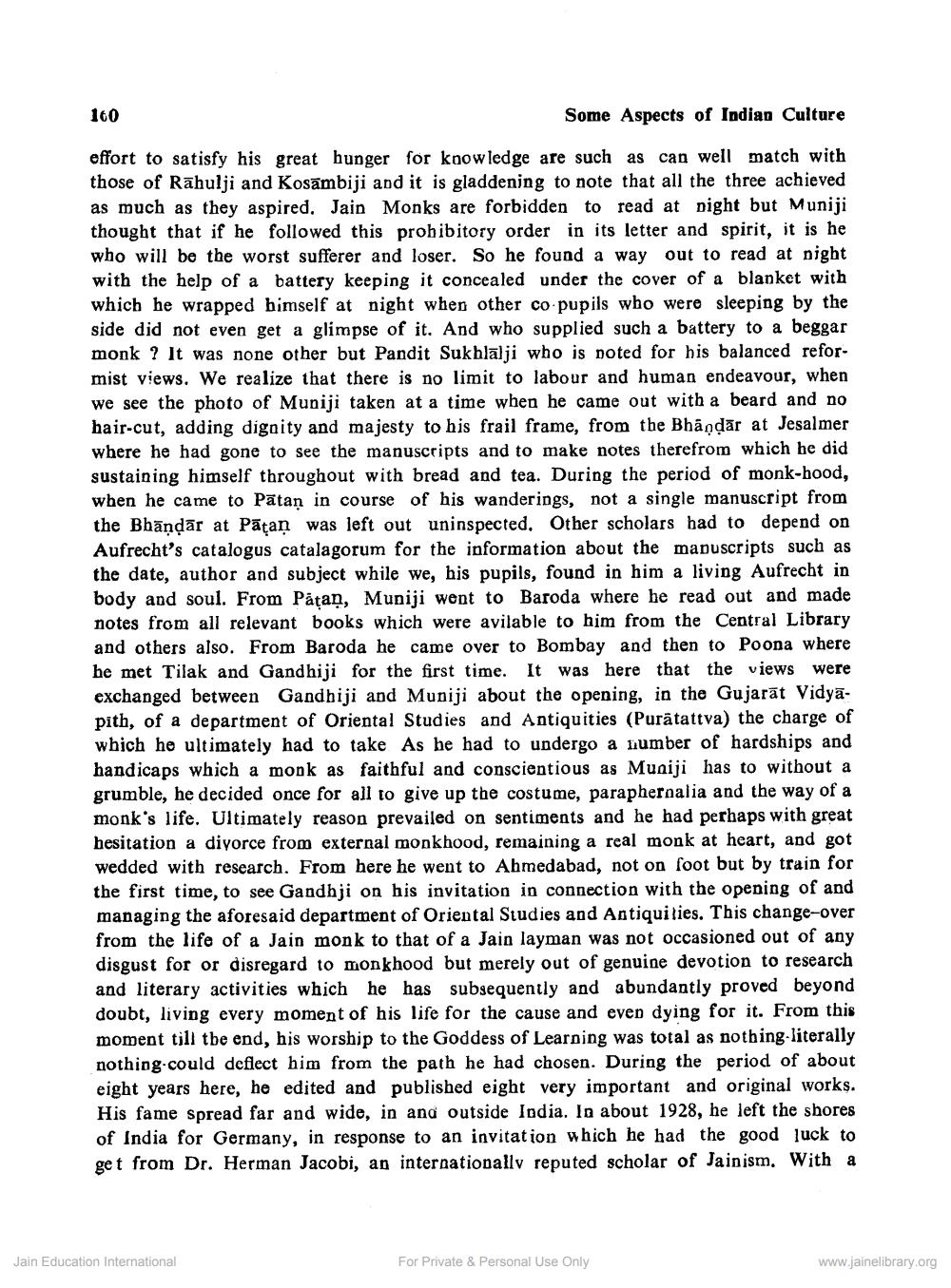________________
100
Some Aspects of Indian Culture
effort to satisfy his great hunger for koowledge are such as can well match with those of Rāhulji and Kosāmbiji and it is gladdening to note that all the three achieved as much as they aspired. Jain Monks are forbidden to read at night but Muniji thought that if he followed this prohibitory order in its letter and spirit, it is he who will be the worst sufferer and loser. So he found a way out to read at night with the help of a battery keeping it concealed under the cover of a blanket with which he wrapped bimself at night when other co-pupils who were sleeping by the side did not even get a glimpse of it. And who supplied such a battery to a beggar monk ? It was none other but Pandit Sukhlālji who is noted for his balanced reformist views. We realize that there is no limit to labour and human endeavour, when we see the photo of Muniji taken at a time when he came out with a beard and no hair-cut, adding digaity and majesty to his frail frame, from the Bhāndār at Jesalmer where he had gone to see the manuscripts and to make notes therefrom which he did sustaining himself throughout with bread and tea. During the period of monk-hood, when he came to Pätan in course of his wanderings, not a single manuscript from the Bhāņdār at Pāțan was left out uninspected. Other scholars had to depend on Aufrecht's catalogus catalagorum for the information about the manuscripts such as the date, author and subject while we, his pupils, found in him a living Aufrecht in body and soul. From Patan, Muniji went to Baroda where he read out and made notes from all relevant books which were avilable to him from the Central Library and others also. From Baroda he came over to Bombay and then to Poona where he met Tilak and Gandhiji for the first time. It was here that the views were exchanged between Gandhiji and Muniji about the opening, in the Gujarāt Vidyāpith, of a department of Oriental Studies and Antiquities (Puratattva) the charge of which he ultimately had to take As he had to undergo a number of hardships and handicaps which a monk as faithful and conscientious as Muniji has to without a grumble, he decided once for all to give up the costume, paraphernalia and the way of a monk's life. Ultimately reason prevailed on sentiments and he had perhaps with great hesitation a diyorce from external monkhood, remaining a real monk at heart, and got wedded with research. From here he went to Ahmedabad, not on foot but by train for the first time, to see Gandhji on his invitation in connection with the opening of and managing the aforesaid department of Oriental Studies and Antiquities. This change-over from the life of a Jain monk to that of a Jain layman was not occasioned out of any disgust for or disregard to monkhood but merely out of genuine devotion to research and literary activities which he has subsequently and abundantly proved beyond doubt, living every moment of his life for the cause and even dying for it. From this moment till the end, his worship to the Goddess of Learning was total as nothing literally nothing could deflect him from the path he had chosen. During the period of about eight years here, he edited and published eight very important and original works. His fame spread far and wide, in and outside Iodia. In about 1928, he left the shores of India for Germany, in response to an invitation which he had the good luck to get from Dr. Herman Jacobi, an internationally reputed scholar of Jainism. With a
Jain Education International
For Private & Personal Use Only
www.jainelibrary.org




